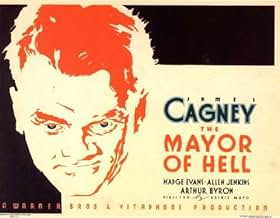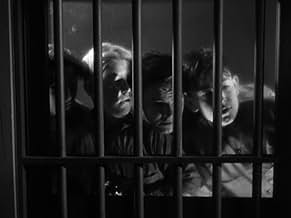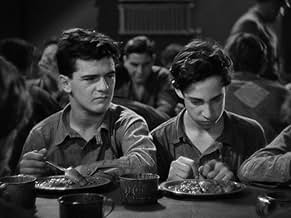Aggiungi una trama nella tua linguaA political appointee with a checkered past tries to institute constructive changes as the deputy commissioner at a cruel reform school but gets pushback from a sadistic warden and a suspici... Leggi tuttoA political appointee with a checkered past tries to institute constructive changes as the deputy commissioner at a cruel reform school but gets pushback from a sadistic warden and a suspicious judge who doesn't trust his motives.A political appointee with a checkered past tries to institute constructive changes as the deputy commissioner at a cruel reform school but gets pushback from a sadistic warden and a suspicious judge who doesn't trust his motives.
- Regia
- Sceneggiatura
- Star
- Premi
- 2 vittorie totali
- Smoke
- (as Farina)
- Brandon
- (as George Pat Collins)
Recensioni in evidenza
Some good scenes, such as the regimented mess hall with its robotic commands and synchronized quick-step. Also, the movie really comes alive during the well-staged riot scene. The raging mob, flickering shadows and wildly burning torches create a disturbingly hellish scene befitting the title. Still, unless I missed something, the mob really is responsible for the cruel Dudley Digges death, allowing the boys to get away with murder or at least manslaughter no matter how much Digges deserves it. This may be an example of justice prevailing over the law during those pre-code days.
Showing how closely the school's operation is tied to greedy political patronage provides an interesting touch. Nonetheless, Cagney's conversion from corrupt ward healer to the George Washington of a boy's republic remains something of a stretch. And I'm sure the stereotype of the Jewish kid may have brought some chuckles in that day, but not in this post-holocaust period. Then too, the black kid's dad may be a crude stereotype, but the boy isn't, participating importantly in republic activities. Notice how subtly his role emerges, probably so as not to offend some audiences. Still, it was a nervy move for the time. Notice also, how deglamorized the boys are. With the many shapes and sizes, they look as though they were recruited off the streets-- another nice touch.
As in most Warner Bros. pictures of the time, there's an atmosphere of New Deal reform, embodied here by the understanding judge who's willing to try unorthodox methods to remedy social ills. All in all, the film stands as an entertaining period piece, with a humane message that stands the test of time.
*** (out of 4)
James Cagney plays a crime boss who uses his power to get a "real" job working in a boys reformatory school. At first he doesn't take the job too serious but then he sees how the boys are mistreated so he takes over running the school and tries to turn it into something good. This film was remade twice in the next six years with Crime School and Hell's Kitchen and while both of those films were very entertaining there's no question this is the best of the three versions. One thing that helps is the fact that this one was made before the code came into play so it has a lot more of a raw feel to it whereas the remakes were toned down in content. Another added bonus is seeing Cagney who once again delivers a strong performance. He doesn't show up until the twenty-five minute mark and it speaks well of the young actors who hold the film up before the star gets on screen. The supporting players all do fine work with Madge Evans as the love interest, Allen Jenkins as Cagney's sidekick and Dudley Digges as the bad guy running the school. I think one fatal flaw is the ending and the aftermath. The ending turns into a Frankenstein type setting, which might have worked but the aftermath is so rushed and faked that it really ends the film on a sour note. Outside of that this is a pretty good drama with its heart in the right place and the toughness you'd expect from a Warner/Cagney film.
This is Cagney playing his good guy gangster. It's solid. The kids are solid pre-Dead End Kids. The morality is pretty simple. My only complaint is nurse Dorothy would never quit. She needs to be outright fired and be carried out kicking and screaming. She's basically abandoning the boys. The guard who gives the boy his coat should be replaced with Dorothy. Patsy's call to Thompson should be replaced with a call to Dorothy. That way the story could still end the same way. This is a very simple moral gangster film.
The villain of the piece is Dudley Digges who is a grafting chiseler and a sanctimonious hypocrite to boot. One of the subtexts of the plot of The Mayor of Hell is that these kids are mostly immigrants and those that judge them and are in positions of power are those who are here a few generations. Note in the mess hall scene as Digges offers a prayer of thanks for the food they are about to receive, Digges is eating well, but the kids are getting quality you wouldn't feed to your pet.
Cagney has his own troubles back in the city with some of his henchmen and he has to take it on the lam. That puts Digges back in charge and setting up the film for it's climax.
The Mayor of Hell was a typical product from the working class studio. And because it was pre-Code it gets pretty gruesome at times. A later version of this, Crime School, with Humphrey Bogart and the Dead End Kids, was a more sanitized remake.
Although Cagney is fine in the lead role as is Madge Evans the school nurse, the acting honors go to Dudley Digges. Hard to believe that the same man could portray the drunken, but kindly, one legged ship's surgeon in Mutiny on the Bounty. But Digges is a fine player and a joy to watch in every film he's in.
This film is not shown too often because of the racial and ethnic stereotypes it portrays. A whole lot of minorities would be offended today. Still it's a fine film.
Interestingly enough a few years ago the film Sleepers came out and it touched on some of the same issues. I guess films about reform schools don't change in any time.
Lo sapevi?
- QuizPatsy is described as a "ward heeler" which is a political operative for a party during an election, mostly involved in vote canvassing. This means Patsy worked to deliver votes from his ward to a particular political machine that was willing to reward him for it.
- BlooperWhen Dorothy goes into her office and locks Patsy out, there is a table outside the door on which four books are resting. In the next shot, a closeup of the table top, there are only two books.
- Citazioni
Lawyer: Tell us what you know, I said! Never mind what you think!
Mr. Hemingway: Excuse me, boss. I ain't no lawyer. I can't talk without thinkin'.
I più visti
- How long is The Mayor of Hell?Powered by Alexa
Dettagli
- Data di uscita
- Paese di origine
- Lingue
- Celebre anche come
- Reform School
- Luoghi delle riprese
- Azienda produttrice
- Vedi altri crediti dell’azienda su IMDbPro
Botteghino
- Budget
- 229.000 USD (previsto)
- Tempo di esecuzione1 ora 30 minuti
- Colore
- Mix di suoni
- Proporzioni
- 1.37 : 1
Contribuisci a questa pagina






































